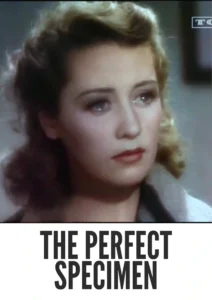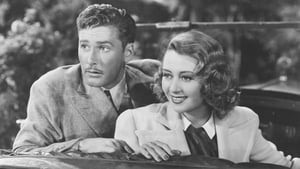Contact: info@alwanfilm.com
Video Sources 0 Views

Synopsis
The Perfect Specimen 1937 Colorized Review: A Romantic Comedy That Stands the Test of Time

Introduction
When reflecting on the golden age of Hollywood, The Perfect Specimen (1937) shines as a delightful example of a romantic comedy that deftly blends humor, charm, and heart. Directed by Michael Curtiz, one of Hollywood’s most prolific and versatile directors, The Perfect Specimen brought together a stellar cast to tell a tale of love, freedom, and individuality. Set against the backdrop of social class differences and featuring the witty banter typical of the era’s screwball comedies, this film was designed to entertain audiences and provide a lighthearted escape.
In this review, we will delve into the brilliance of The Perfect Specimen, exploring its storyline, the performances of its charismatic cast, the film’s thematic undertones, and its place in the pantheon of 1930s romantic comedies. By examining the director’s vision, the significance of the film in its time, and its reception, we’ll uncover why The Perfect Specimen still holds appeal for modern viewers and how it continues to charm audiences to this day.
Check The Full Colorized Movies List
Check Our Colorized Movies Trailer Channel
Understanding The Perfect Specimen 1937 Colorized: Director, Cast, and Genre
Director’s Vision
Michael Curtiz, known for directing iconic films such as Casablanca (1942) and The Adventures of Robin Hood (1938), showcased his adaptability and expertise across multiple genres in The Perfect Specimen. In this film, Curtiz navigates the intricate demands of romantic comedy with ease, expertly balancing moments of comedic misunderstanding with heartfelt romance. Curtiz had a gift for extracting memorable performances from his actors, and The Perfect Specimen is no exception. His keen eye for pacing and character development ensures that the film remains engaging from start to finish.
While Curtiz would later be celebrated for his work on dramatic and adventure films, his direction here highlights his versatility as a filmmaker, demonstrating that he was just as adept at handling the breezy, comedic elements of The Perfect Specimen as he was with more serious material.
The Iconic Performance of Actors
The film stars the dynamic Errol Flynn, known for his swashbuckling roles in films like Captain Blood (1935) and The Sea Hawk (1940), in a rare turn as a romantic lead in a comedy. Flynn’s performance in The Perfect Specimen showcases his natural charm, charisma, and comedic timing, traits that were somewhat overshadowed in his more action-oriented roles. Flynn plays Gerald Beresford Wicks, a sheltered heir who has been raised under the strict control of his overbearing grandmother. His portrayal is endearing and humorous, as he navigates the challenges of newfound independence and the complexities of falling in love.
Opposite Flynn is the delightful Joan Blondell, a seasoned comedienne who brings vivacity and wit to the role of Mona Carter, an independent woman who becomes Gerald’s love interest. Blondell’s portrayal of Mona is a highlight of the film, as she embodies a confident, self-assured woman who challenges societal norms and teaches Gerald how to live life on his own terms. The chemistry between Flynn and Blondell is palpable, making their scenes together both hilarious and heartwarming.
The supporting cast, including May Robson as the domineering grandmother Mrs. Wicks, adds depth to the film. Robson’s portrayal of Mrs. Wicks is both formidable and amusing, providing the perfect foil to Flynn’s naive Gerald. Allen Jenkins also delivers a memorable performance as the quirky chauffeur, drawing additional laughs with his quick-witted dialogue.
Exploring the Genre
The Perfect Specimen is a classic example of the screwball comedy genre that was immensely popular in the 1930s. The genre, known for its fast-paced dialogue, romantic entanglements, and often absurd situations, offered audiences a comedic escape from the realities of the Great Depression. In the case of The Perfect Specimen, the film incorporates all the hallmarks of screwball comedy: mistaken identities, witty banter, and a humorous clash of social classes.
At its core, the film is about the liberation of its protagonist from the rigid expectations of wealth and propriety, a theme that resonated strongly with Depression-era audiences seeking entertainment that affirmed individualism and the pursuit of happiness. The romantic chemistry, comedic misunderstandings, and social commentary combine to make The Perfect Specimen a quintessential screwball comedy that stands the test of time.
Exploring the World of The Perfect Specimen 1937 Colorized: Plot and Characters
Detailed Synopsis
The Perfect Specimen (1937) tells the story of Gerald Beresford Wicks, a young man who has lived his entire life under the watchful eye of his controlling grandmother, Mrs. Wicks. Raised in the lap of luxury, Gerald is groomed to be the “perfect specimen” of a well-bred gentleman, adhering to his grandmother’s strict rules and expectations. Despite his wealth and privilege, Gerald feels suffocated by his lack of freedom and yearns for a life beyond the carefully crafted bubble in which he has been placed.
Enter Mona Carter, a free-spirited woman who crashes into Gerald’s life, literally and figuratively. When Mona’s car breaks down near the Wicks estate, she meets Gerald, and the two embark on a series of adventures that take them far from the rigid social structure in which Gerald has been raised. Through their journey, Mona teaches Gerald about independence, self-reliance, and the joy of living life on one’s own terms.
As Gerald becomes increasingly enchanted by Mona’s world of freedom, he begins to defy his grandmother’s control, much to her chagrin. The film’s plot revolves around Gerald’s attempts to break free from the stifling expectations placed upon him, all while navigating his growing feelings for Mona. Along the way, comedic mishaps, misunderstandings, and the inevitable romantic tension arise, making for an engaging and heartwarming story.
The Complex Protagonists and Memorable Supporting Characters
Gerald Beresford Wicks, as portrayed by Errol Flynn, is the film’s central figure, and his character arc is one of personal growth and self-discovery. At the beginning of the film, Gerald is the quintessential “perfect specimen” of aristocratic upbringing—well-mannered, obedient, and utterly devoid of any personal agency. However, through his interactions with Mona and his rebellion against his grandmother’s control, Gerald gradually learns to think and act for himself.
Mona Carter, played by Joan Blondell, is the antithesis of Gerald’s structured life. Independent, adventurous, and outspoken, Mona represents the freedom and self-determination that Gerald craves. Her influence on Gerald is transformative, and Blondell’s portrayal imbues the character with humor and warmth, making her a relatable and endearing figure.
Mrs. Wicks, Gerald’s domineering grandmother, is a classic example of the controlling matriarch trope often seen in screwball comedies. Played by May Robson, Mrs. Wicks is both a comedic and somewhat menacing figure, representing the social constraints that Gerald must overcome to achieve personal freedom. Her character provides much of the film’s humor, particularly in her exaggerated attempts to maintain control over her grandson’s life.
Themes Explored in The Perfect Specimen 1937 Colorized
Social Class and Freedom
One of the key themes in The Perfect Specimen is the tension between social class and personal freedom. Gerald’s upbringing, governed by his grandmother’s rigid expectations, reflects the constraints of high society and the burden of inherited wealth. His journey toward independence, facilitated by his relationship with Mona, mirrors a broader societal desire for individuality and self-expression, particularly during the 1930s when economic hardship led many to question traditional social structures.
Mona, as a working-class woman who values her independence, embodies the ideal of freedom from societal expectations. Her interactions with Gerald challenge the notion that wealth and privilege equate to happiness, and her influence prompts Gerald to reconsider what truly matters in life.
Love and Self-Discovery
At its heart, The Perfect Specimen is also a love story, but not just between Gerald and Mona—it’s also about Gerald’s love for himself and his newfound sense of agency. The film explores the idea that true love is only possible when individuals are free to be themselves, unencumbered by societal or familial expectations. Gerald’s growth as a character, from a passive participant in his own life to an active decision-maker, is a key part of the film’s emotional core.
The Art of Screwball Comedy: A Brief History
Origins and Characteristics
Screwball comedies emerged during the early 1930s as a response to the grim realities of the Great Depression. These films offered lighthearted escapism, often featuring fast-paced dialogue, physical comedy, and absurd situations. At the center of most screwball comedies was a romantic pairing that often found themselves at odds with each other due to class differences, misunderstandings, or a battle of the sexes.
The Perfect Specimen exemplifies many of the characteristics of screwball comedies, particularly in its exploration of class differences and the comedic tension between Gerald and Mona. Their contrasting personalities and social backgrounds serve as the foundation for much of the film’s humor, while the rapid-fire dialogue and witty banter keep the audience engaged.
Reception and Controversy Surrounding The Perfect Specimen 1937 Colorized
Initial Reviews and Audience Reactions
Upon its release in 1937, The Perfect Specimen was well-received by both critics and audiences. Errol Flynn, known primarily for his roles in swashbuckling adventure films, surprised viewers with his comedic chops, while Joan Blondell’s performance was praised for its vivacity and wit. Critics lauded the film for its charming performances, lighthearted tone, and sharp dialogue, cementing its place as a beloved romantic comedy of its era.
While the film didn’t generate significant controversy, it did stir conversations about the social dynamics it portrayed. The film’s depiction of class differences, particularly through the relationship between Gerald and Mona, was seen as a subtle critique of the rigid social hierarchies that were still prevalent in 1930s America.
Where to Watch The Perfect Specimen 1937 Colorized Online
The Perfect Specimen (1937) can be enjoyed by modern audiences through various streaming platforms, including Amazon Prime Video, Turner Classic Movies, and other classic film services. Additionally, DVD versions of the film are available for purchase online, allowing viewers to revisit this charming romantic comedy in both digital and physical formats.
Conclusion
The Perfect Specimen (1937) remains a quintessential example of the screwball comedy genre, offering audiences a delightful mix of romance, humor, and social commentary. Under Michael Curtiz’s direction, the film showcases Errol Flynn and Joan Blondell at their comedic best, delivering performances that continue to resonate with viewers today. With its timeless themes of freedom, individuality, and love, The Perfect Specimen stands as a testament to the enduring appeal of classic Hollywood cinema. Whether you’re a fan of romantic comedies or simply looking for a lighthearted film to brighten your day, The Perfect Specimen is a must-watch.











